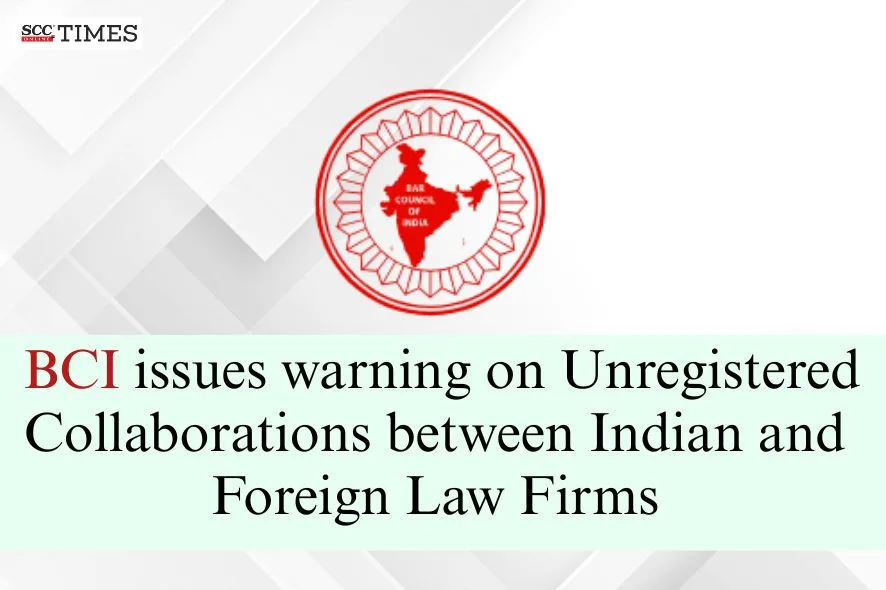On 21-10-2025, the Bar Council of India withdrew its press release dated 5-8-2025 and substitutes it with the press release dated 21.10.2025 laying down instances of unauthorized, unregistered, and impermissible collaborations or combinations between Indian law firms/ Advocates and foreign law firms/ Advocates.
This Press Release is for the legal practitioners, law firms, both Indian and foreign, clients, and members of the public.
Need:
-
Certain foreign law firms/ Advocates/ entities, in association with Indian law firms/ Advocates, are presenting themselves as unified/ integrated global legal service platforms.
-
These combinations are often structured through Swiss Vereins, strategic alliances, exclusive referral models, or joint branding initiatives, and publicly promoted under combined entities.
-
These practices have portrayed to the clients and public at large a de facto integrated legal practice across jurisdictions, including within India.
-
From information available in the public domain, certain law firms and advocates are prima facie found violating the Bar Council of India Rules for Registration and Regulation of Foreign Lawyers and Foreign Law Firms in India, 2022.
Bar Council of India Rules for Registration and Regulation of Foreign Lawyers and Foreign Law Firms in India, 2022:
-
It enabled foreign lawyers and foreign law firms to practice foreign law, diverse international law, and international arbitration matters in India on the principle of reciprocity, in a well-defined, regulated, and controlled manner.
-
These rules lay down the prerequisites, procedural formalities, and substantive requirements for any Indian-foreign law firm collaboration.
-
Requirements of these rules: registration, disclosure, governance, and ethical compliance.
-
Through the amendment dated 13-5-2025, it was clarified that foreign lawyers and foreign law firms are prohibited from appearing before any court, tribunal, or other statutory or quasi-judicial authority in India, or before any authority legally competent to take evidence on oath.
Bar Council of India v. A.K. Balaji, (2018) 5 SCC 379:
-
The Supreme Court reaffirmed the foreign law firms cannot do indirectly what they cannot do directly.
-
The Supreme Court held that in determining what amounts to practice of law, the principle of pith and substance applies.
-
It further held that a foreign law firm or group of firms can only practice foreign law and international law in non- litigious matters in India after registration under the Bar Council of Rules. Without registration it cannot:
-
Practice Indian law in any form in India, directly or indirectly;
-
Under its head or brand practice Indian law in any form even though the work is executed by an Indian firm acting under that name;
-
appear in courts or tribunals, nor can it draft or advise on Indian law transactions.
-
-
The Court also held that the Advocates Act applies not only to individual advocates but equally to companies, firms, associations, or juridical persons. Hence, if the prohibition applies to an individual foreign lawyer, it applies equally to a foreign law firm, to a network styled as an association, and to any group of lawyers acting collectively.
Permitted sphere of Practice for foreign lawyers/ law firms.
-
Foreign lawyers can only engage in non- litigious work related to foreign or international law either:
-
Temporarily under the Fly-In-Fly-Out arrangement;
-
After registering with the Bar Council of India under its regulatory framework.
-
-
Foreign lawyers can advise or appear in international arbitration cases held in India only if the dispute involves foreign or international law.
If the case is governed by Indian Law or involves evidence recorded under oath, they cannot participate in advocacy or represent clients.
-
The prohibition applies equally whether the foreign law firm acts directly or whether an Indian firm operates under its head, brand, or group identity.
Prohibition on solicitation and advertising under Rules of the Bar Council of India (Standards of Professional Conduct and Etiquette):
The Bar Council of India observed multiple public communications including launch events of foreign- linked entities, press releases announcing membership in international networks, and websites portraying India offices as part of global firm.
In these cases, the Bar Council of India will assess if the content in substance advertises, solicits, or holds out integrated legal practice, it will be deemed to be treated as a violation.
Steps taken to resolve the issue:
-
The Bar Council of India has issued separate show-cause notices to concerned entities and individuals involved in these arrangements.
-
The notices direct them to submit comprehensive written explanations, full documentation of the arrangements, and declarations as to structure, operations, governance, and regulatory disclosures.
-
Failure to comply with will result in proceedings under the Advocates Act, 1961 and the Rules, including proceedings for professional misconduct and other statutory consequences.
-
The Council is also in the process of issuing show- cause notices to other entities which appear similarly placed.
Conclusion:
The Bar Council of India has reiterated that it has adopted a liberalized and transparent regulatory framework for entry of foreign lawyers and firms. They can practice foreign law and international law in India after registration. They cannot practice Indian law or engage in litigation. The framework is designed to safeguard the sovereignty of the Indian legal profession while permitting lawful cross-border cooperation.


